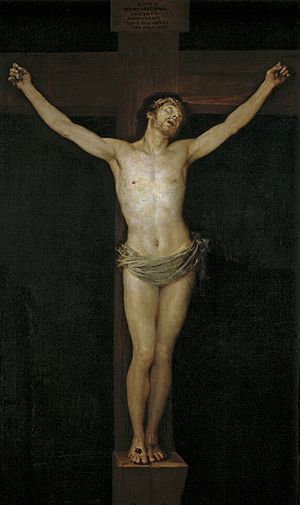Christ Crucified (Goya) facts for kids
Quick facts for kids Christ Crucified |
|
|---|---|
| Spanish: Cristo crucificado | |
 |
|
| Artist | Francisco de Goya |
| Year | 1780 |
| Medium | Oil on canvas |
| Dimensions | 255 cm × 154 cm (100 in × 61 in) |
| Location | Museo del Prado, Madrid |
The painting Christ Crucified (Spanish: Cristo crucificado) was created in 1780. It is an oil painting on canvas by the famous Spanish artist Francisco de Goya. This artwork shows the crucifixion of Jesus.
Goya gave this painting to the Real Academia de Bellas Artes de San Fernando. It was his "reception piece," which means it was a special artwork he submitted to become a full member of the Academy. Today, you can see this important painting at the Prado Museum in Madrid, Spain.
Why Was This Painting Important to Goya?
When Goya first painted Christ Crucified, many people admired it. It helped him become a respected artist in his time. The painting shows Goya's skill and how he followed the art rules of the Academy.
How Did People View the Painting Over Time?
Later, in the 20th century, some art experts thought less of this painting. They preferred to see Goya only as a "Romantic" painter. This style focused on strong feelings and imagination. They believed Goya didn't care much for traditional religious art.
However, more recently, people have looked at Goya's work differently. They now understand that Christ Crucified was very important for Goya's career. It helped him gain professional respect and show his talent. This painting is now seen as a key part of his artistic journey.
See also
 In Spanish: Cristo crucificado (Goya) para niños
In Spanish: Cristo crucificado (Goya) para niños
- List of works by Francisco Goya
 | Stephanie Wilson |
 | Charles Bolden |
 | Ronald McNair |
 | Frederick D. Gregory |

